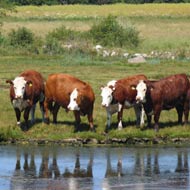
Owners urged to ensure fields have suitable drainage
Livestock owners are being urged to take precautionary measures this winter to protect animals in areas where there are flood warnings in place.
The warning comes as new figures show a third of vets working with livestock or horses last year had clients who lost stock due to flooding.
Results from the BVA’s Voice of the Veterinary Profession Survey also show that over 20 per cent of vets reported problems due to animals being cut off from food. A further 27 per cent saw cases of flood-related lameness, exacerbated by standing in water and deep mud.
“We know that livestock keepers and farmers are well of the risks of flooding. But our survey shows that owners can still get caught out and that livestock can easily be lost to flooding,” commented Gudrun Ravetz, president of the BVA.
“Thinking ahead and having a contingency in place is a wise move for hard-pushed livestock farmers and we’re encouraging large animal owners to be vigilant this winter, particularly where there are flood warnings in place.”
In light of the survey's findings, the BVA - together with the Sheep Veterinary Society, the British Cattle Veterinary Association, the British Equine Veterinary Association and the Goat Veterinary Society - are advising large animal owners to keep their stock out of harm's way.
While most livestock keepers are well-aware of the risks posed by flooding, the associations are encouraging extra caution if animals are usually kept near a river.
‘If fields are prone to flooding then, where possible, it’s advised that owners move their livestock ahead of time to a drier field during the winter,’ they write.
The organisations also suggest owners make sure their fields have suitable drainage and an area where animals can stand out of the mud or damp. Not only do such conditions predispose animals to infections and diseases, they also provide the ideal habitat for the Galba Trucatula snail - the intermediate host for liver fluke.
Once water recedes, livestock owners are urged to inspect pastures and streams for potentially hazardous plants, such as the roots of water dropwort.
If the weather gets particularly bad, farmers are advised to move livestock to sheltered areas closer to home. This will keep the animals dry and ensure owners stay safe themselves by avoiding trips out into exposed land.



 The latest
The latest